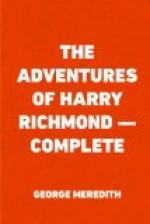‘You have seen the last of me, madam,’ my father said to her whirling carriage-wheels.
He tried to shake, and strained in his ponderous garments. Temple gazed abashed. I knew not how to act. My father kept lifting his knees on the spot as if practising a walk.
The tent was in its old place covering the bronze horse. A workman stepped ahead of us, and we all went at a strange leisurely pace down the hill through tall pinetrees to where a closed vehicle awaited us. Here were also a couple of lackeys, who deposited my father on a bed of moss, and with much effort pulled his huge boots off, leaving him in red silk stockings. Temple and I snatched his gauntlets; Temple fell backward, but we had no thought of laughter; people were seen approaching, and the three of us jumped into the carriage. I had my father’s living hand in mine to squeeze; feeling him scarcely yet the living man I had sought, and with no great warmth of feeling. His hand was very moist. Often I said, ‘Dear father!—Papa, I’m so glad at last,’ in answer to his short-breathed ’Richie, my little lad, my son Richmond! You found me out; you found me!’ We were conscious that his thick case of varnished clothing was against us. One would have fancied from his way of speaking that he suffered from asthma. I was now gifted with a tenfold power of observation, and let nothing escape me.
Temple, sitting opposite, grinned cheerfully at times to encourage our spirits; he had not recovered from his wonderment, nor had I introduced him. My father, however, had caught his name. Temple (who might as well have talked, I thought) was perpetually stealing secret glances of abstracted perusal at him with a pair of round infant’s eyes, sucking his reflections the while. My father broke our silence.
‘Mr. Temple, I have the honour,’ he said, as if about to cough; ’the honour of making your acquaintance; I fear you must surrender the hope of making mine at present.’
Temple started and reddened like a little fellow detected in straying from his spelling-book, which was the window-frame. In a minute or so the fascination proved too strong for him; his eyes wandered from the window and he renewed his shy inspection bit by bit as if casting up a column of figures.
‘Yes, Mr. Temple, we are in high Germany,’ said my father.
It must have cost Temple cruel pain, for he was a thoroughly gentlemanly boy, and he could not resist it. Finally he surprised himself in his stealthy reckoning: arrived at the full-breech or buttoned waistband, about half-way up his ascent from the red silk stocking, he would pause and blink rapidly, sometimes jump and cough.
To put him at his ease, my father exclaimed, ‘As to this exterior,’ he knocked his knuckles on the heaving hard surface, ’I can only affirm that it was, on horseback—ahem! particularly as the horse betrayed no restivity, pronounced perfect! The sole complaint of our interior concerns the resemblance we bear to a lobster. Human somewhere, I do believe myself to be. I shall have to be relieved of my shell before I can at all satisfactorily proclaim the fact. I am a human being, believe me.’




